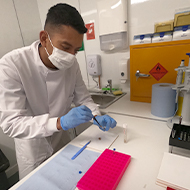
Organisations help improve access to biological material
The Royal Zoological Society of Scotland and National Museums Scotland are working together to help develop the UK's first zoological biobank.
As part of the CryoArks Biobank initiative, the Royal Zoological Society of Scotland (RZSS) and National Museums Scotland are both launching new facilities equipped with ultra-low temperature freezers, laboratory space and an online searchable database to help store and distribute animal biological material.
The national biobank provides scientists access to tissue, cells and DNA from endangered species to help bolster research and conservation efforts.
Dr Andrew Kitchener, principal curator of vertebrates at National Museums Scotland, said: “This project is crucial in enabling researchers to engage with a vast resource of biological data samples which until now was difficult to access.
“We have a responsibility to future generations to ethically collect these biological samples, store them in appropriate conditions and make them available for research. These specimens are vital to our understanding of the natural world and our ability to map its changes and respond effectively to the demands of researchers working in conservation and ecology.”
For more than 25 years, National Museums Scotland has been building a collection of tissue samples from donated animals. This collection of several thousand samples has been added to the biobank to help scientists across the UK.
RZSS is also one of four hubs, alongside others in Denmark, Belgium and Germany, to form part of the European Association of Zoos and Aquaria (EAZA) biobank, which hosts animal genetic resources across Europe and the Middle East.
Dr Helen Senn, head of conservation and science programmes at RZSS said: “Well managed sample collections are critical research tools which can be used to improve conservation outcomes for many threatened species.
“We are extremely grateful to the multitude of researchers and zoological institutions who are contributing samples that can be used by scientists for the benefit of wildlife around the world.”
Images (c) RZSS.



 The RCVS has announced a new version of its 1CPD mobile app, with enhanced features for veterinary surgeons and veterinary nurses to record their continuing professional development.
The RCVS has announced a new version of its 1CPD mobile app, with enhanced features for veterinary surgeons and veterinary nurses to record their continuing professional development.